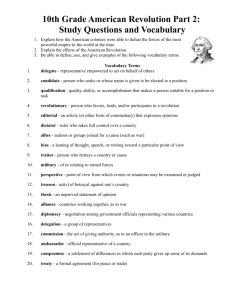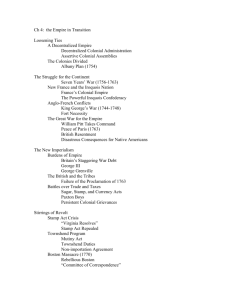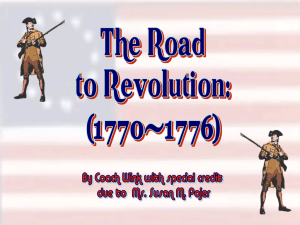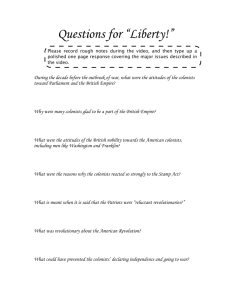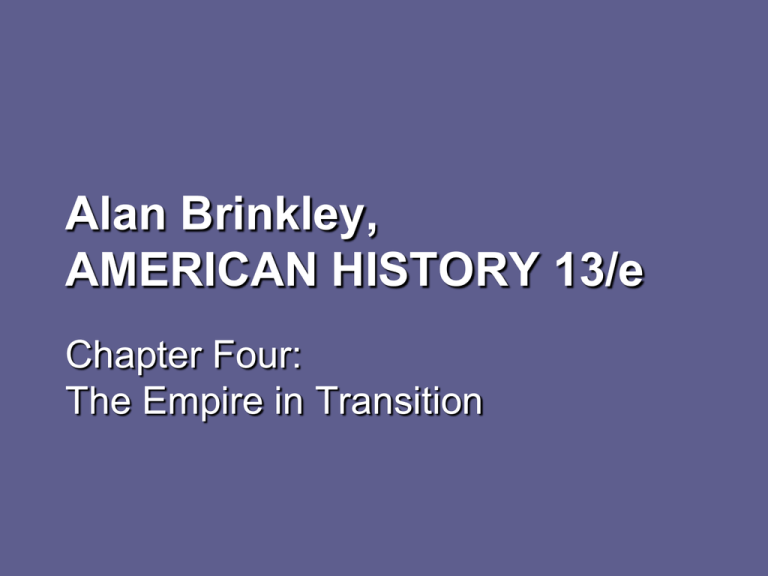
Alan Brinkley,
AMERICAN HISTORY 13/e
Chapter Four:
The Empire in Transition
Chapter Four:
The Empire in Transition
I. Loosening Ties
Mid-18th century – colonists liked the British b/c they left
them alone and allowed freedoms (salutary neglect)
1760s-1770s – changes in international & domestic affairs
led England to increase control over the colonies
– A Tradition of Neglect
Growing Power of Parliament – they didn’t care as much to have a lot
of power over the colonies
Decentralized Colonial Administration – they were corrupt; didn’t care
about policy, so allowed legislature to rule
Powerful Colonial Legislatures – took over duties of taxing, spending;
thought of themselves as sovereign
2
© 2010, The McGraw-Hill Companies, Inc. All Rights Reserved.
Chapter Four:
The Empire in Transition
I. Loosening Ties
– The Colonies Divided
Albany Plan of Union (1754) – Benjamin
Franklin tried to unite colonies against a
common foe (French/Indians) for the war
Colonies refused
From the
Pennsylvania
Gazette, 1754
3
Chapter Four:
The Empire in Transition
II. The Struggle for the Continent
An Uneasy Balance of Power
France & Britain
Name of Conflict
fought over Atlantic
supremacy over trade King William’s War
and naval power
- Resulted in many wars Queen Anne’s War
Date of Conflict
1689-1697
1701-1713
King George’s War 1744-1748
4
© 2010, The McGraw-Hill Companies, Inc. All Rights Reserved.
Chapter Four:
The Empire in Transition
II. The Struggle for the Continent
– New France and the Iroquois Nation
New Sources of Conflict – Ohio Valley
French had good relations with Indians, except the
Iroquois (largest Indian nation)
The Iroquois Confederacy – after King George’s War,
they granted trade concessions to England
Upset French, who began to build forts
5
Chapter Four:
The Empire in Transition
II. The Struggle for the Continent
– English-French Conflicts
English created own forts
Fort Necessity (Fort Duquesne)
Area near present-day Pittsburgh,
fought over by French and English (led
by George Washington)
G.W. defeated, begins French and
Indian War
6
© 2010, The McGraw-Hill Companies, Inc. All Rights Reserved.
Chapter Four:
The Empire in Transition
II. The Struggle for the Continent
– French and Indian War (Seven Years’ War)
Gen. Edward Braddock defeated due to little help from
England or Iroquois
P.M. William Pitt Takes Charge
Used forced enlistment, impressments, & confiscation
of goods w/o payments to support war efforts
Caused colonial resistance
British siege of Quebec – beginning of the end
Peace of Paris – ended war, all of North America east of
MS River (except New Orleans) now British
7
Chapter Four:
The Empire in Transition
II. The Struggle for the Continent
– French and Indian War (Seven Years’ War)
Consequences of the Seven Years’ War
United colonists against a common foe
Resisted British interference in local affairs
American militia, who fought with the English, began
to notice stark differences between them
Indians receive British enmity; now Iroquois
confederacy unravels
8
Chapter Four:
The Empire in Transition
The Seven Years’ War
9
© 2010, The McGraw-Hill Companies, Inc. All Rights Reserved.
Chapter Four:
The Empire in Transition
III. The New Imperialism
– Burdens of Empire
Commercial Versus Territorial Imperialists
Now British government wants more control over colonial affairs
Ended salutary neglect
Britain’s Staggering War Debt
Major debt from war; British taxes already high, so they began to
tax the colonies
George III’s Shortcomings
10
Wanted to be an involved monarch, but had mental problems and
was immature
Appointed ministry with George Grenville
He believed colonies should obey the law and pay their fair
share
Chapter Four:
The Empire in Transition
King George III
The Thirteen Colonies in 1763
11
© 2010, The McGraw-Hill Companies, Inc. All Rights Reserved.
Chapter Four:
The Empire in Transition
III. The New Imperialism
– The British and the Tribes
Proclamation of 1763
Pontiac’s Rebellion – an attempt by Indians to stem
the tide of westward migration
Result – proclamation (by Grenville) stating no
colonists could move west of Appalachians
White Encroachment – Indians happy, but colonists
ignore and still move past the line
12
© 2010, The McGraw-Hill Companies, Inc. All Rights Reserved.
Chapter Four:
The Empire in Transition
North America in 1763
13
© 2010, The McGraw-Hill Companies, Inc. All Rights Reserved.
Chapter Four:
The Empire in Transition
III. The New Imperialism
– Grenville’s Program
Quartering Act – stationing troops and ships in the
colonies
Sugar Act – reorganized duties on sugar and molasses
Vice-admiralty court established in colonies
Currency Act – stopped the use of paper currency
Stamp Act – tax on all printed documents
14
© 2010, The McGraw-Hill Companies, Inc. All Rights Reserved.
Chapter Four:
The Empire in Transition
III. The New Imperialism
– The Colonial Response
It did collect revenue, but also increased anger in
colonists
Anxiety increased due to a postwar depression; more
taxes made life harder for colonists
Paxton Boys and Regulator Movement did move attention
away from the British policies for a little while
Political Consequences of the Grenville Program –
stirrings of revolt
15
© 2010, The McGraw-Hill Companies, Inc. All Rights Reserved.
Chapter Four:
The Empire in Transition
IV. Stirrings of Revolt
– The Stamp Act Crisis
Effects of the Stamp Act
Focused colonial antagonism to, and unification against, new
British policies
Virginia Resolves (Patrick Henry)
Only representative assemblies could tax colonists
Sons of Liberty (MA)
Encouraged mob action & sacked Lt. Gov. Thomas Hutchinson’s
house
Parliament Retreats
Rescinds Stamp Act; adds Declaratory Act simultaneously
16
The Tory’s Day of Judgment
(Library of Congress)
17
© 2010, The McGraw-Hill Companies, Inc. All Rights Reserved.
Chapter Four:
The Empire in Transition
IV. Stirrings of Revolt
– The Townshend Program (Charles Townshend took control
of British gov’t)
Mutiny (Quartering) Act
Since colonists refused to follow it, Townshend suspended the
New York Assembly until they followed them (NY=scapegoat)
Internal and External Taxes – new taxes on lead, paint,
paper, glass, and tea;
Colonists upset b/c they felt it was an internal tax; Townshend
blew it off; said it was external, so they should like it
Colonial Boycotts
18
MA urged all colonies to resist all taxes
Promoted American production (all homespun – Daughters of
Liberty)
Result – all duties repealed, except on tea
Chapter Four:
The Empire in Transition
IV. Stirrings of Revolt
– The Boston Massacre
Troops sent to Boston to protect Board of Customs
Commissioners
Upset Bostonians b/c British troops competing with
them for scarce jobs
March 1770 – mob harassed British troops, troops fire on
mob, 5 killed (1st casualty of American Revolution =
Crispus Attucks)
Result – Samuel Adams created and led Committee of
Correspondence; used propaganda
Meant to communicate to all colonies
19
The Boston Massacre
(Library of Congress)
20
© 2010, The McGraw-Hill Companies, Inc. All Rights Reserved.
IV. Stirrings of Revolt
– The Philosophy of Revolt
Took ideas from both Puritan ideology and Whig ideology
England’s Balanced Constitution
The colonists liked England’s power distribution; felt it would
avoid corruption and tyranny
Didn’t want a single power; felt it was corrupt (e.g., King George
III)
Virtual Versus Actual Representation
21
Colonists felt they could be taxed only by their consent as
expressed through direct representatives
Rejected virtual representation – Parliament legislating for the
nation as a whole
Advocated active representation – legislation by a body of their
peers directly accountable to them
Chapter Four:
The Empire in Transition
IV. Stirrings of Revolt
– The Tea Excitement
Revolutionary Discourse – calm in the colonies, but still
talks of revolution
The Tea Act – allowed British East India Company to sell
tea to colonies w/o duties; colonists upset b/c it set up a
tea monopoly
Boston Tea Party – March 1773
Response to Tea Act; Sons of Liberty “Dump the Tea
into the Sea!”
Set off other retaliatory actions in both England and
the colonies
22
© 2010, The McGraw-Hill Companies, Inc. All Rights Reserved.
Chapter Four:
The Empire in Transition
IV. Stirrings of Revolt
– The Tea Excitement
Coercive Acts – aka the Intolerable Acts (as dubbed by
colonists)
Closed port of Boston
Limited MA self-governing
Required quartering of troops
Royal officials were tried in England
Consequences
With the Coercive Acts and the Quebec Act, the colonists felt
England was being tyrannical
The colonists unified their resistance to these actions by passing
resolves and boycotting goods
23
© 2010, The McGraw-Hill Companies, Inc. All Rights Reserved.
Chapter Four:
The Empire in Transition
V. Cooperation and War
– New Sources of Authority
First Continental Congress
Endorsed grievances
Approved Suffolk Resolves (recommended military
preparation to defend against the British)
Enforced boycotts
The Conciliatory Propositions
Britain rescinded Coercive Acts; tried to appeal to
colonial moderates (to no avail)
24
© 2010, The McGraw-Hill Companies, Inc. All Rights Reserved.
Chapter Four:
The Empire in Transition
V. Cooperation and War
– Lexington and Concord
General Thomas Gage sent troops to Lexington
and Concord in April of 1775
Sent to arrest Samuel Adams and John
Hancock and seize gunpowder
Alerted by Paul Revere and William Dawes,
minutemen resisted; 8 were killed
25
© 2010, The McGraw-Hill Companies, Inc. All Rights Reserved.
Chapter Four:
The Empire in Transition
V. Cooperation and War
– The Revolution Begins
British troops burned what little powder they
found
Attached by minutemen as they returned to
Boston
“Colonial” version of events at Lexington and
Concord rallied Americans to a patriot cause
Now most colonists see the clear difference
between Americans and the English
26
© 2010, The McGraw-Hill Companies, Inc. All Rights Reserved.
Chapter Four:
The Empire in Transition
The Battles of Lexington and Concord, 1775
27
© 2010, The McGraw-Hill Companies, Inc. All Rights Reserved.
Recruiting Poster
28
(Library of Congress)
© 2012, The McGraw-Hill Companies, Inc. All Rights Reserved.
SOURCE 2:
https://docs.google.com/viewer?a=v&pid=sites&srcid=ZGVmYXVsdGRvbWFpbnxtcnNhYnJhbWVpdHNjbGFzc3Jvb
218Z3g6MThkYTM2N2QyZDlkYzUxYg


